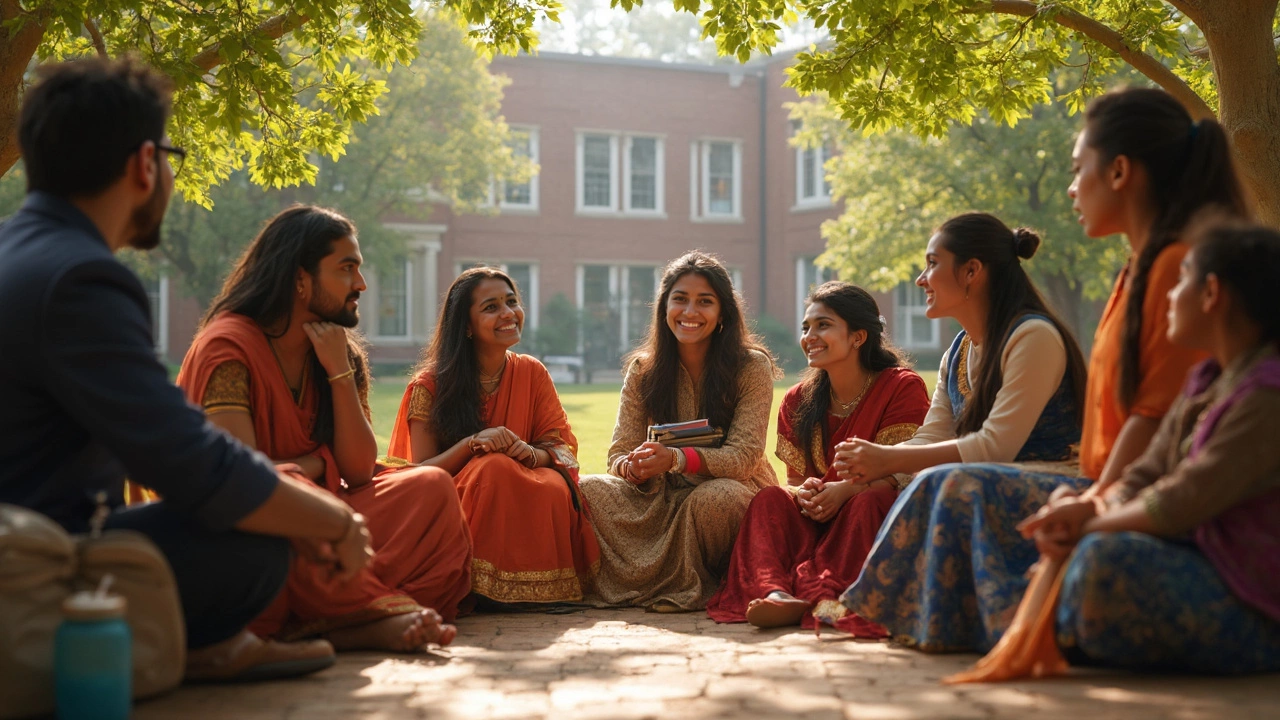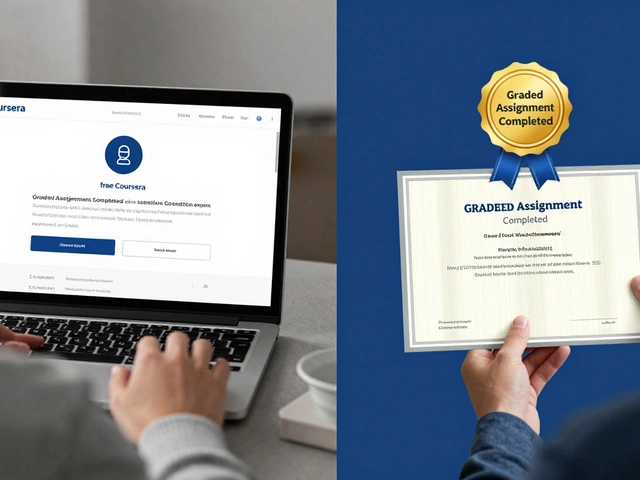Ever wondered what it's like to study in the USA instead of sticking around in India? The allure of world-class universities and a dynamic environment might just be the push you need. Imagine being surrounded by top-notch infrastructure and cutting-edge tech. The excitement isn't just in academic circles; it's about the chance to dive into research that actually changes the world.
But hey, it’s not just about hitting the books. Studying in the USA offers a blend of cultures, letting you taste a slice of life that’s totally different from what you know. Meeting folks from around the globe and exploring diverse viewpoints can give you a deeper understanding of the world. Plus, the friendships and networks you build can open doors in ways you'd never imagine back home.
- World-Class Education System
- Research and Innovation Opportunities
- Cultural Exposure and Personal Growth
- Career Opportunities and Networking
- Practical Tips for Transition
World-Class Education System
So, what's the big deal about studying in the USA? For starters, the education system there is top-notch. We're talking about universities that consistently rank among the world's best. Take the likes of Harvard, MIT, and Stanford. These places aren't just fancy names; they’re hubs of academic brilliance.
The USA offers a flexible curriculum, which means students can explore diverse fields before settling on a major. Unlike back home where you're pretty much locked into a track, here you get a buffet of options. You're not just black and white; you could be studying computer science and also dabbling in liberal arts. Cool, right?
You’ll find that the emphasis on research and innovation is massive. Universities invest heaps into state-of-the-art research facilities. That’s partly why tech giants like Google and Facebook often collaborate with these institutions. The chance to participate in cutting-edge research can seal the deal for many Indian students.
The teaching methods are pretty hands-on too. Instead of just textbook learning, students engage in discussions, projects, and internships. This practical approach not only boosts understanding but also makes education more engaging. So, if you've ever felt stuck in rote learning, the USA's system could be a breath of fresh air.
Overall, the exposure to diverse courses and teaching styles can transform the way you think and learn. It's like moving from playing a basic guitar to a full-on symphony orchestra. If that sounds appealing, the USA might just be the right spot for you to make educational leaps.
Research and Innovation Opportunities
Diving into the world of research in the USA is a bit like stepping into a treasure chest of possibilities. You know those Hollywood movies that show scientists making breakthrough discoveries? Well, some of that magic is real. The USA is home to several of the world's leading research universities, including MIT, Stanford, and Harvard, and they're constantly pushing the boundaries of what's possible.
Indian students find the research culture in the USA particularly attractive because it's not just about following instructions—it's about asking 'what if?' and having the resources to chase those questions down. In fields like technology, healthcare, and engineering, American institutions are often equipped with state-of-the-art labs and technology. This access means you can work on exciting projects that will shape future industries.
Let’s not forget the breathtaking number of patents coming out of American universities every year. You're literally standing on the shoulders of giants. The focus is on innovation, and study in USA often means being at the groundbreaking edge of research in your field.
- Large Funding Pools: Many US universities have extensive funding available for research, which means better equipment and more opportunities for hands-on learning.
- Interdisciplinary Projects: Collaboration across departments means you can mix things up—combine your interest in computer science with bioengineering, and see where it leads.
- Mentor Availability: Faculty in the USA are usually very approachable and eager to involve students in their research, a boon for any budding researcher.
If you're chasing cutting-edge education abroad, remember that the USA doesn't just teach—it inspires you to think bigger and bolder. Who knows, you might be contributing to the next big innovation too!

Cultural Exposure and Personal Growth
Studying in the USA is not just about academic achievements; it's a chance for a whole new level of cultural exposure and personal growth. Imagine stepping out of your comfort zone and experiencing life where you’re surrounded by different cultures, beliefs, and attitudes. It’s pretty transformative, right?
The USA is often described as a melting pot, with students from all corners of the world. This diversity is a goldmine for understanding a variety of cultures. You can learn new traditions, try different cuisines, and celebrate unique festivals. This exposure pushes you to be more open-minded and adaptable—skills highly sought after in today's globalized world.
When you're studying abroad, you also meet people who become friends for life. These relationships often provide more than just companionship; they offer a network that can be invaluable in your future career. Think about the potential of knowing people from different industries and careers!
Additionally, the opportunity to live independently in a new country contributes significantly to personal growth. You learn to manage finances, navigate new social settings, and solve problems on your own. These experiences build confidence and prepare you for life's challenges, giving you a unique edge that you can’t always get back home.
With every experience and every new friend, studying in the USA makes you grow not just as a student but as a person.
Career Opportunities and Networking
One big reason to study in the USA instead of India is the sheer amount of career opportunities you get exposed to. The job market in the US is vast and varied, offering roles in top global companies. It's not uncommon to find students landing internships in firms like Google, Facebook, or Amazon. Internships like these can be stepping stones—sometimes, a summer gig could evolve into a full-time position post-graduation.
Now, let’s talk about networking. This isn't just about exchanging business cards; it's a lifestyle. US colleges actively host networking nights, career fairs, and even casual coffee chats with industry professionals. So, you’re not just limited to meeting peers from class, but also industry giants who’ve made a mark. These connections can be crucial in getting your foot in the door.
The US education system also encourages practical learning. Think capstone projects, hands-on labs, and collaboration with both local and international researchers. Such experiences make your resume pop out when compared to purely theoretical knowledge.
While it's hard to put a price on global exposure, there's some data to chew on. According to a study, international students with US degrees tend to earn 20% more than their peers who don’t study abroad. That's quite the incentive, right? And for those wondering about visas, the US offers Optional Practical Training (OPT), letting students work in their field for up to three years after they graduate in STEM fields.
In short, the combination of high-impact networking and abundant career opportunities often leads to rewarding post-study careers. Indian students who take this route often find themselves in spots that could redefine their career trajectory. Excited yet?

Practical Tips for Transition
Alright, thinking of making the big leap from studying in India to the USA? Here are some no-nonsense tips to help you make this transition smooth and stress-free. First thing's first, make sure to get your paperwork sorted. You'll need to apply for a student visa, typically an F1. This involves getting your admission letter from a university, so plan those applications early to snag your spot.
Before you pack your bags, get a grip on your finances. Studying abroad isn't cheap, but there are plenty of scholarships and financial aid options if you look hard enough. Check out what each university offers and apply to everything you're eligible for. You can also look into getting part-time work on campus once you're settled in, which helps with expenses and gives you some experience too.
When it comes to settling in, American campuses are pretty diverse, so you’ll fit right in. It's still a good idea to brush up on cultural differences and maybe pick up a little more confidence in speaking English with strangers. It's less about the grammar and more about understanding and being understood.
Let’s talk logistics. Find housing early — whether you’re opting for an on-campus dorm or hunting for an off-campus apartment. Getting your accommodation sorted will save you from a ton of headache. Also, figure out transportation. Most campuses have decent public transport, but it might not hurt to learn the ropes early on.
Social media and forums can be your best friend. Join groups for Indian students in the USA or at your specific university. These groups often have valuable firsthand advice on everything from meal plans to which professors are legends.
Lastly, keep emergency contacts handy and familiarize yourself with local laws—it’s better to be safe and informed. Stay in touch with friends and family back home, to keep homesickness at bay. Remember, this experience is all about growth and learning, so dive in fully!




